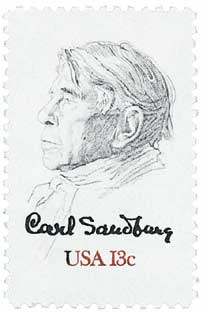
# 1731 FDC - 1978 13c Carl Sandburg
Â
Birth Of Carl SandburgÂ
When he was 13, Sandburg dropped out of school and began driving a milk wagon. Over the next few years, he attended West Point for two weeks and worked several jobs, including bricklayer, farm laborer, hotel servant, and coal-heaver.
In 1898, Sandburg fought in the Spanish-American War with the sixth Illinois Infantry. He also briefly attended Lombard College but left without a degree in 1903. Sandburg got his first writing job as a journalist for the Chicago Daily News and the Day Book.
Sandburg was most well known for his poetry, which largely focuses on Chicago. One of his most famous lines described the city as “Hog Butcher for the World/ Tool Maker, Stacker of Wheat/ Player with Railroads and the Nation’s Freight Handler, / Stormy, Husky, Brawling, City of the Big Shoulders.â€

Sandburg was also a celebrated children’s writer, and his most popular work in the genre was Rootabaga Stories. He wrote this collection as “American fairy tales†that more accurately reflected American childhood. Sandburg didn’t believe American children could relate to the European stories about royalty and knights, so he filled his stories with skyscrapers, trains, corn fairies, and the “Five Marvelous Pretzels.â€
In 1927, Sandburg published The American Songbag, a widely popular collection of American folk songs. Sandburg was one of the early American urban folk singers and would bring his guitar along on his lectures and poetry recitals.
A fellow son of Illinois, Carl Sandburg grew up listening to stories about Abraham Lincoln. He suggested that Lincoln’s face appear on the penny, as it was the coin of the common folk, whom Lincoln praised. In 1923, Sandburg began working on a book for young people, so they could learn about Lincoln as he had.

However, Sandburg found himself so caught up in the stories, he didn’t want to stop. Instead, he published his two-volume Abraham Lincoln: The Prairie Years in 1925. He spent another 13 years researching Lincoln’s four years in the White House, culminating in Abraham Lincoln: The War Years. Published in 1939, it won a Pulitzer Prize.
Sandburg also won two Pulitzer Prizes for his poetry, one for Cornhuskers in 1918 and ones for his Complete Poems in 1951. He also recorded excerpts of his Lincoln biography and received a Grammy Award for Best Performance in a Documentary or Spoken Word.
Sandburg died on July 22, 1967. After his death, President Lyndon B. Johnson said that Sandburg “was more than the voice of America, more than the poet of its strength and genius. He was America.†His childhood home is now a historic site and many schools and other locations have been named in his honor.
Click here to read some of Sandburg’s poetry.
Â
Â
Birth Of Carl SandburgÂ
When he was 13, Sandburg dropped out of school and began driving a milk wagon. Over the next few years, he attended West Point for two weeks and worked several jobs, including bricklayer, farm laborer, hotel servant, and coal-heaver.
In 1898, Sandburg fought in the Spanish-American War with the sixth Illinois Infantry. He also briefly attended Lombard College but left without a degree in 1903. Sandburg got his first writing job as a journalist for the Chicago Daily News and the Day Book.
Sandburg was most well known for his poetry, which largely focuses on Chicago. One of his most famous lines described the city as “Hog Butcher for the World/ Tool Maker, Stacker of Wheat/ Player with Railroads and the Nation’s Freight Handler, / Stormy, Husky, Brawling, City of the Big Shoulders.â€

Sandburg was also a celebrated children’s writer, and his most popular work in the genre was Rootabaga Stories. He wrote this collection as “American fairy tales†that more accurately reflected American childhood. Sandburg didn’t believe American children could relate to the European stories about royalty and knights, so he filled his stories with skyscrapers, trains, corn fairies, and the “Five Marvelous Pretzels.â€
In 1927, Sandburg published The American Songbag, a widely popular collection of American folk songs. Sandburg was one of the early American urban folk singers and would bring his guitar along on his lectures and poetry recitals.
A fellow son of Illinois, Carl Sandburg grew up listening to stories about Abraham Lincoln. He suggested that Lincoln’s face appear on the penny, as it was the coin of the common folk, whom Lincoln praised. In 1923, Sandburg began working on a book for young people, so they could learn about Lincoln as he had.

However, Sandburg found himself so caught up in the stories, he didn’t want to stop. Instead, he published his two-volume Abraham Lincoln: The Prairie Years in 1925. He spent another 13 years researching Lincoln’s four years in the White House, culminating in Abraham Lincoln: The War Years. Published in 1939, it won a Pulitzer Prize.
Sandburg also won two Pulitzer Prizes for his poetry, one for Cornhuskers in 1918 and ones for his Complete Poems in 1951. He also recorded excerpts of his Lincoln biography and received a Grammy Award for Best Performance in a Documentary or Spoken Word.
Sandburg died on July 22, 1967. After his death, President Lyndon B. Johnson said that Sandburg “was more than the voice of America, more than the poet of its strength and genius. He was America.†His childhood home is now a historic site and many schools and other locations have been named in his honor.
Click here to read some of Sandburg’s poetry.
Â










